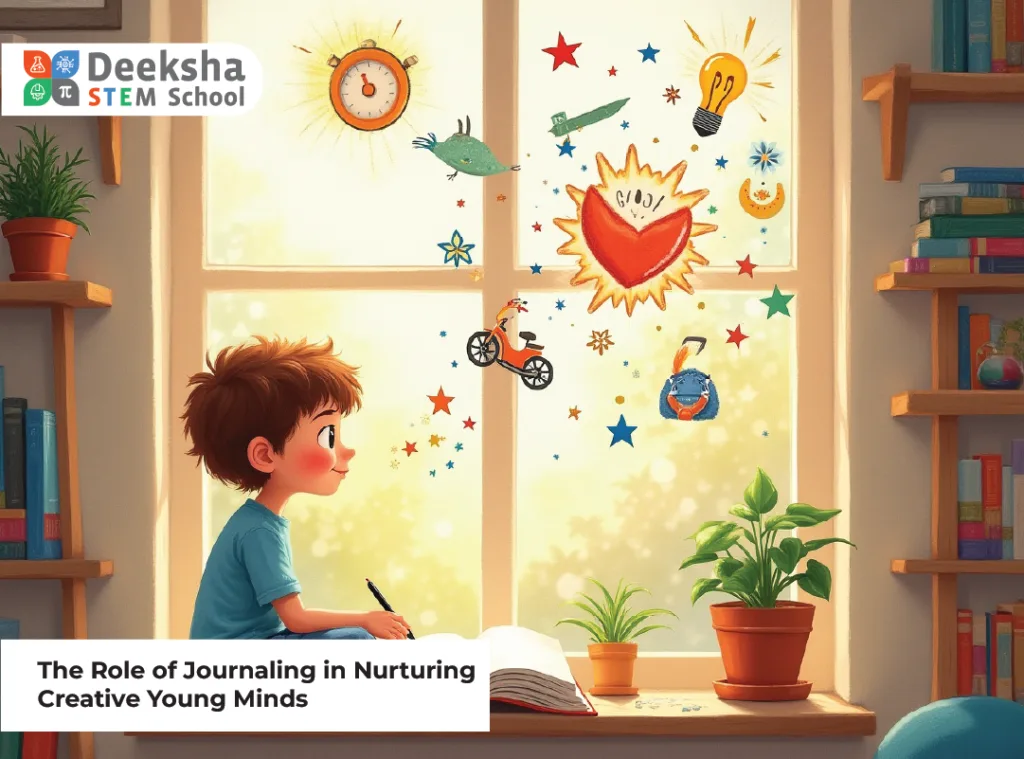In today’s digital-first world filled with distractions and instant gratification, journaling offers a rare and invaluable pause—a space where children can slow down, reflect, and connect with their inner world. It’s more than just writing; journaling becomes a personal canvas where thoughts take shape, emotions find a voice, and imagination gets room to flourish.
At Deeksha STEM Schools, we champion journaling not merely as an educational tool, but as a developmental practice essential to shaping well-rounded, emotionally intelligent, and creative individuals. Through reflective writing, children learn to process information, articulate their perspectives, and develop metacognitive awareness about how they think and learn.
Why Journaling Matters for Growing Minds
- Boosts Creativity: When children are given the freedom to write without judgment, they explore their imagination, invent new worlds, and generate original ideas.
- Enhances Language Skills: Regular journaling improves syntax, vocabulary, and overall writing fluency. It fosters a natural love for language and communication.
- Supports Emotional Intelligence: Journaling allows children to express and navigate emotions in a safe space, fostering empathy, resilience, and emotional maturity.
- Strengthens Memory and Focus: Writing things down helps consolidate learning, improve concentration, and boost recall of both academic and personal experiences.
- Promotes Self-Awareness: By reflecting on daily events, dreams, or challenges, children gain a deeper understanding of themselves, their goals, and their motivations.
- Builds Confidence: When children see their thoughts and stories taking shape, they develop a strong sense of ownership and self-worth.
Types of Journaling for Kids
| Journal Type | Benefits |
| Daily Reflection Journal | Cultivates routine reflection and helps children process their emotions |
| Gratitude Journal | Encourages positivity, appreciation, and mental well-being |
| Creative Writing Journal | Inspires storytelling, poetry, and the exploration of fictional worlds |
| STEM Idea Journal | A space for scientific observation, innovation tracking, and discovery |
| Visual Journal | Combines images, drawings, and written words to capture complex ideas |
| Travel or Memory Journal | Documents experiences and builds narrative around real-life events |
| Goal-Setting Journal | Helps kids visualize their aspirations and track their progress |
By offering diverse formats and approaches, children can experiment with the journaling method that feels most natural to them.
How Deeksha STEM Uses Journaling in Learning
At Deeksha STEM, journaling is not treated as a one-size-fits-all activity. We integrate it across subject areas and customize it to suit a wide range of learning goals:
- Science Journals: Students document lab experiments, write observational notes, sketch diagrams, and reflect on outcomes to reinforce scientific thinking.
- Literary Logs: After reading novels or poems, students respond through reflective writing—creating alternate endings, analyzing characters, or connecting stories to real life.
- Math Reflections: Learners write about how they approached a problem, what challenges they faced, and how they felt during the problem-solving process.
- Weekly Mindfulness Journals: Students write about what they’re grateful for, what made them smile, or what they’d like to improve—promoting emotional well-being.
- Innovation Diaries: These are used in STEM clubs where students sketch inventions, write hypotheses, and map progress over time on ongoing projects.
- Language Enrichment Journals: Encourage multilingual students to write in multiple languages, boosting fluency and cross-cultural appreciation.
We provide students with materials that reflect their creativity—colorful covers, stickers, textured paper, and open-ended prompts—to make journaling feel expressive and exciting.
Tips for Parents to Encourage Journaling at Home
- Offer personalized notebooks and writing tools that your child enjoys using
- Dedicate a quiet journaling corner at home with minimal distractions
- Make journaling a family ritual—perhaps before bedtime or after dinner
- Encourage various forms of journaling like drawing, writing, or even collage
- Avoid correcting grammar or spelling—it’s about expression, not perfection
- Ask open-ended questions like, “What’s something new you noticed today?” or “If today had a color, what would it be?”
- Celebrate journaling milestones—filling the first notebook, reaching 30 consecutive days, etc.
Frequently Asked Questions
1. What if my child doesn’t like writing?
- That’s okay! Start with simple, creative formats like drawing-based journals, sticker stories, or sentence starters. Gradually, kids often warm up to the process once they feel safe expressing themselves.
2. Can journaling help with academic subjects?
- Yes. Journaling complements academic learning by improving retention, promoting critical thinking, and offering a space for students to explore subjects more deeply from their own perspective.
3. How often should kids journal?
- Even journaling 2–3 times a week can bring noticeable benefits. Consistency matters more than frequency. Over time, it becomes a healthy habit and a self-care tool.
4. Is digital journaling effective too?
- Digital tools are a great supplement, especially for tech-savvy learners. However, handwriting has a unique neurological impact that strengthens memory and cognitive processing. A balance of both is ideal.
5. How does Deeksha STEM’s journaling approach differ?
- We treat journaling as a holistic practice rather than a writing assignment. Our cross-curricular journaling strategies encourage reflective, innovative, and personalized learning that caters to each student’s voice and strengths.
Final Thoughts
Journaling is a timeless gift—a simple notebook and pen can open the door to immense personal growth. For young learners, it becomes a compass for creativity, resilience, self-awareness, and emotional balance. In a world driven by results, journaling reminds us to pause, reflect, and find meaning.
At Deeksha STEM Schools, we nurture this powerful habit in our classrooms and beyond. Whether it’s through a science journal, a storybook idea, or a visual diary, we help students discover their voice and shape their unique learning journey.
Visit our campuses at Bannerghatta Road, Judicial Layout, Kengeri, and Vidyanagar to see how we are fostering a new generation of mindful, creative thinkers—one journal at a time.






Leave A Comment